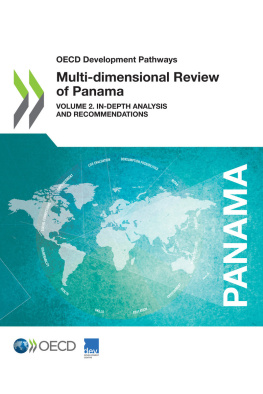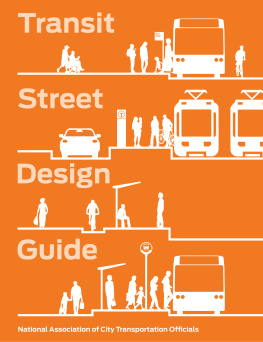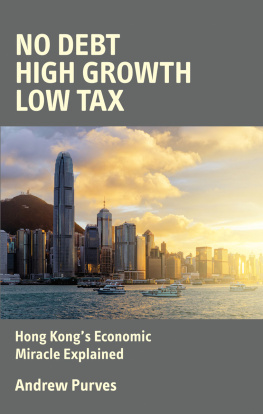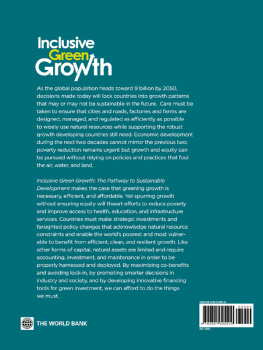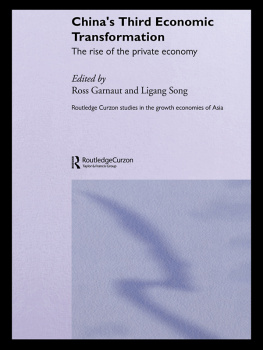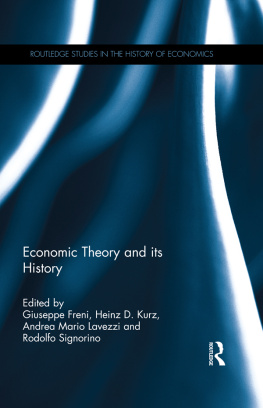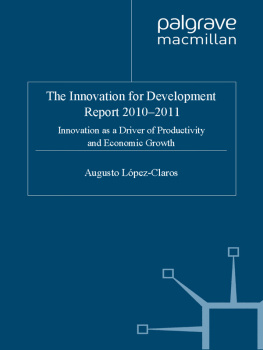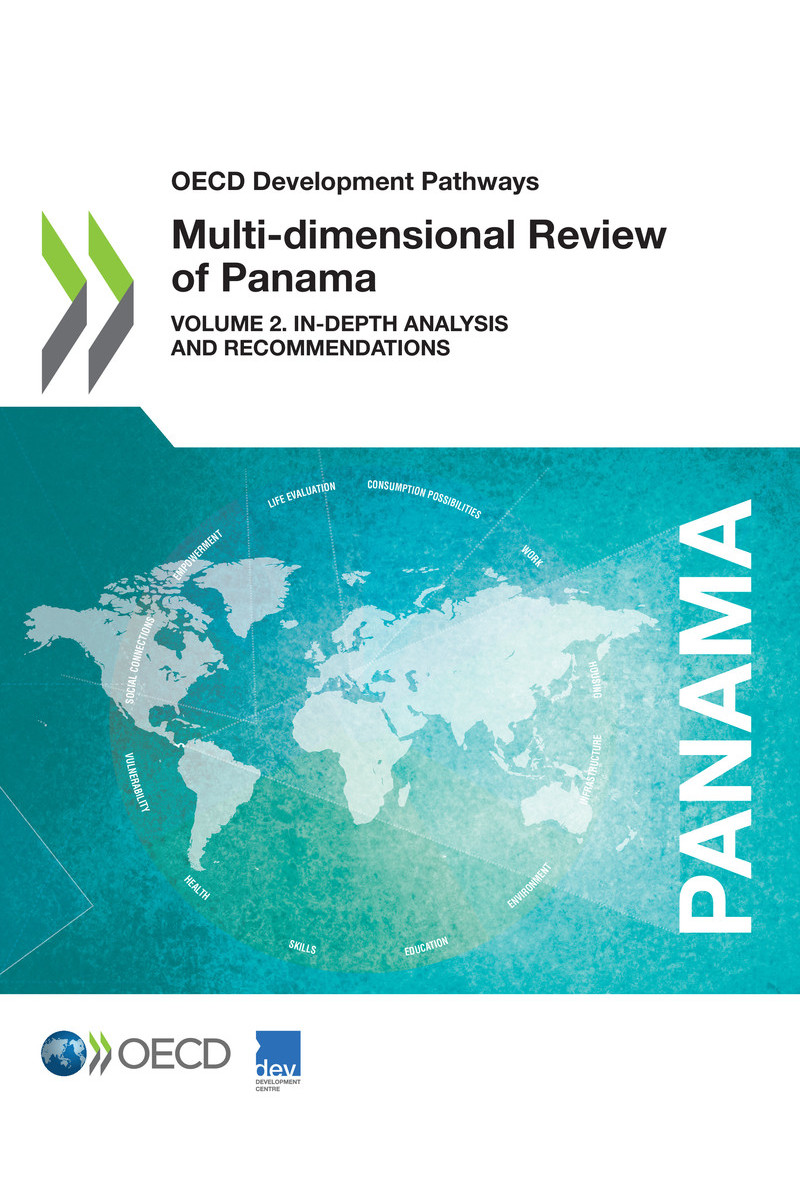OECD Development Pathways
Multi-Dimensional Review of Panama Volume 2: In-depth Analysis and Recommendations
Please cite this publication as:
OECD (2018), Multi-Dimensional Review of Panama: Volume 2: In-depth Analysis and Recommendations , OECD Development Pathways, OECD Publishing, Paris.
https://doi.org/10.1787/9789264302549-en
Metadata, Legal and Rights
ISBN: 978-92-64-30253-2 (print) - 978-92-64-30254-9 (pdf) - 978-92-64-30360-7 (HTML) - 978-92-64-30359-1 (epub)
DOI: https://doi.org/10.1787/9789264302549-en
Series: OECD Development Pathways
ISSN: 2308-734X (print) - 2308-7358 (online)
This work is published under the responsibility of the Secretary-General of the OECD. The opinions expressed and arguments employed herein do not necessarily reflect the official views of the member countries of the OECD or its Development Centre.
This document, as well as any data and any map included herein, are without prejudice to the status of or sovereignty over any territory, to the delimitation of international frontiers and boundaries and to the name of any territory, city or area.
The statistical data for Israel are supplied by and under the responsibility of the relevant Israeli authorities. The use of such data by the OECD is without prejudice to the status of the Golan Heights, East Jerusalem and Israeli settlements in the West Bank under the terms of international law.
Photo credits: Cover design by the OECD Development Centre.
Corrigenda to OECD publications may be found on line at: www.oecd.org/publishing/corrigenda .
OECD 2018
You can copy, download or print OECD content for your own use, and you can include excerpts from OECD publications, databases and multimedia products in your own documents, presentations, blogs, websites and teaching materials, provided that suitable acknowledgement of OECD as source and copyright owner is given. All requests for public or commercial use and translation rights should be submitted to .
Foreword
Economic growth matters, but it is just one facet of development. Policy makers should focus their attention on ensuring that their countrys development path is sustainable and that the lives of their citizens improve. This requires reconciling economic, social and environmental objectives.
OECD Development Pathways is a series that looks at multiple development objectives beyond an exclusive focus on growth. It recognises well-being as part and parcel of development and helps governments identify the main constraints to more equitable and sustainable growth by undertaking a multi-dimensional country review (MDCR). Governments trying to achieve economic, social and environmental objectives need to understand the constraints they face and develop comprehensive and well sequenced strategies for reform that take into account the complementarities and trade-offs across policies. The MDCR methodology is based on quantitative economic analysis, as well as qualitative approaches including foresight and participatory workshops that involve actors from the private and public sectors, civil society, and academia.
The MDCRs are composed of three distinct phases: initial assessment, in-depth analysis and recommendations, and implementation of reforms in the identified key areas. This approach allows for a progressive learning process about the countrys specific challenges and opportunities that culminates in a final synthesis report to inform reforms in the country.
The MDCR of Panama is the third review, following that of Peru and Uruguay, to be undertaken by the OECD in Latin America. The MDCR of Panama Volume 1, Initial Assessment was launched in October 2017. This second volume, In-depth Analysis and Recommendations, focuses on three key constraints for inclusive development in Panama, namely skills and formal jobs, regional development and financing for development.
This MDCR is designed to help Panama formulate development strategies, and identify and support the policy reforms needed to achieve further sustainable and inclusive development. This review comes at a time when Panama is achieving high economic growth but further policy action is needed to expand socio-economic benefits across all economic sectors, regions and households. A forthcoming volume, based on the recommendations presented in this second volume, will present the necessary conditions and actions for making reform happen. These analyses support Panamas own development agenda towards achieving a brighter future for its citizens.
Acknowledgements
Multi-dimensional Country Reviews are the result of a collaborative effort of the OECD and the country under review. Work on this second phase of the Multi-dimensional Review of Panama was carried out by the OECD Development Centre in collaboration with the OECD Centre for Entrepreneurship (CEF) and the OECD Centre for Tax Policy and Administration (CTP), together with support from the Ministry of Economy and Finance of Panama.
Mario Pezzini, Director of the OECD Development Centre, guided and oversaw the review. The Multi-dimensional Country Review process is led by Jan Rielaender, Head of the MDCR Unit and Angel Melguizo, Head of Latin America and the Caribbean Unit, both at the OECD Development Centre.
The review was co-ordinated by Sebastin Nieto Parra, Deputy-Head of Latin America and the Caribbean Unit at the OECD Development Centre, and drafted by Juan Carlos Bentez, Paula Cerutti, Juan de Laiglesia, Rene Orozco and Sebastin Nieto Parra (OECD Development Centre); Maria Varinia Michalun and Isabelle Chatry (OECD Centre for Entrepreneurship); and Agustin Redonda (Council on Economic Policies). The tax and benefit incidence analysis was done by Sandra Martinez under the guidance of Nora Lustig (Commitment to Equity (CEQ) Institute Tulane University). Additional inputs were provided by Lyse Marques and Nathalia Montoya Gonzalez (OECD Development Centre). The team is grateful for the insightful discussions, data provided and comments made by Federico Bonaglia, Juan Vzquez Zamora, Carine Viac and Agustina Vierheller (OECD Development Centre); Monica Bhatia, Bert Brys, Cline Colin and Jeremiah Coder (OECD Centre for Tax Policy); Dorothe Allain-Dupr and Oscar Huerta-Melchor (OECD Centre for Entrepreneurship); Patrick Lenain (Economics Department); Catalina Covacevich (OECD Directorate for Education and Skills); and Paolo Falco (OECD Directorate for Employment, Labour and Social Affairs).
Various ministries and public agencies provided useful support during the authors visit to Panama in October 2017 as well as throughout the production of the report. The role of the Ministry of Economy and Finance, the main counterpart for this report, was particularly valuable, both technically and analytically. Special thanks go to Vice Minister Gustavo Valderrama Rodrguez, Director of Public Policies Marissa Echevers, and Rubilu Rodriguez from the same Directorate for all their support. The Panamanian Embassy in Paris, member of the OECD Development Centres Governing Board provided crucial support in the realisation and production process of this report.
Other ministries and public agencies also contributed largely, namely: the National Institute of Statistics at the Office of the Comptroller General of the Republic of Panama, the Panama Canal Authority, the Ministry of Development and Social Inclusion, the Ministry of Education, the Ministry of Energy, the Ministry of Health, the Ministry of Labour, the National Secretariat of Energy, AMUPA (Association of Municipalities of Panama), the Vice Ministry of Indigenous Affairs, Kuna Yala Comarca, the National Decentralization Secretariat, the Panama City Town Hall and the Ministry of Government. Finally, the team is grateful to the participants of two workshops hosted by the Ministry of Economy and Finance in Panama in November 2016 and October 2017 that brought together stakeholders from a broad set of backgrounds to identify global trends that could affect Panamas future development.

